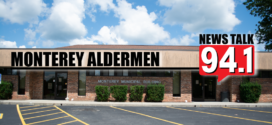Though the recommendations change frequently, a Cookeville Regional hospitalist said it appears oxygen and time are the best treatments for COVID-19.
“We’ve got the ability to do quite a few different treatment plants, and the thing of it is, is that the the recommendations change pretty frequently because this is a virus,” Dr. Rebecca Sprouse said.
Sprouse has been one of the lead physicians in creating CRMC’s treatment strategy for COVID. She said CRMC has all the treatment tools being recommended right now. As with most sicknesses, people respond differently to different treatments.
“We’ve had patients who’ve come into the hospital who done very, very well and, you know, 48 out, 24 to 48 hours after they come into the hospital, they’re on just a little bit of oxygen or on no oxygen,” Sprouse said. “And we can send them home with the remainder of a treatment course of steroid. And they do quite well. And we’ve had people who’ve come into the hospital who stayed for the entire treatment and still their oxygen levels are not doing well.”
Sprouse said the virus continues to evolve. For example, in recent days, she has tested several people with GI symptoms that previously would not have been tested because gastrointestinal issues were not thought to be part of COVID.
“But still, the people who are getting the sickest are the ones who’ve got the respiratory symptoms,” Sprouse said.
Cookeville Regional COVID numbers have been steady over the last two weeks. Sprouse said more and more, people contracting COVID express guilt that they contracted the virus. Sprouse said there’s no reason for that.
“It’s people who are coming in who are saying, ‘you know, I’ve done everything that I’ve been told to do. I’m wearing a mask and washing my hands. I’m doing all of the things that I’m told. And somehow I still I still got this virus,'” Sprouse said. “And I think that honestly, what it’s going to boil down to is, is that at some point it’s going to be ubiquitous. You’re going to probably come into contact with in any way. You do the best that you can, but it’s a virus. It’s out there and it’s going to come into contact with most people at some point in time anyway.”
“I don’t think that, you know, it’s something that people need to feel guilty about if they end up getting sick from it. And unfortunately, we have come into contact with a lot of people who feel like they’ve done something wrong because they’ve they’ve gotten sick.”
Sprouse said the initial suggestions in March to wait until you were short of breath before getting treatment no longer applies. Sprouse said get medical treatment as soon as you feel sick.
“If you’re starting to get sick and we can we can test people, we can start treating them sooner,” Sprouse said. “We can get them on treatment that may make them so that they don’t get to the point where they’re short of breath and require hospitalization.”
 News Talk 94.1/AM 1600 Where The Upper Cumberland Talks
News Talk 94.1/AM 1600 Where The Upper Cumberland Talks







